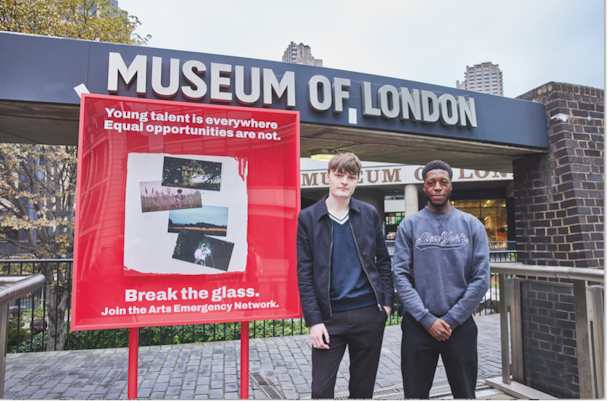UK creative talent made us and saved us; now it’s time to repay the favor
Writing in support of Arts Emergency, FCB Inferno’s chief creative officer Owen Lee makes the case for creativity’s essential value to our economy and culture – and explains why improving access for marginalized voices can provide a lifeline for its future.

FCB Inferno’s CCO Owen Lee makes the case for creativity’s essential value to our economy
You could be forgiven for thinking that commerce and creativity were natural enemies.
Business enjoys ‘known knowns’ and certainty, and is best practiced based on the basis of established rules. Creativity, on the other hand, is all about throwing things up in the air and suddenly entertaining the ridiculous – if only for a moment. It’s about questioning everything, even these accepted ‘known knowns,’ in a bid to find something new.
Such thinking can struggle to hold much sway in the boardrooms that drive the economic success on which our functioning society depends. But, when an unstoppable outside force grabs everything that businesses considered untouchable and hurls it all into the sky, what happens? After the initial chaos, creativity shines.
This is precisely what we’ve seen unfold over the past 18 months. During the pandemic, creativity was used to address some of the biggest, most existential questions a business could ever ask of itself. From our perspective as an ad agency, the nature of our work changed – rather than generating traditional marketing, we found ourselves cast as the creative thinkers trying to solve the myriad problems thrown up by Covid-induced disruption.
One client needed to know how to get all their posters down and pivot into social. An entertainment brand wanted to know how they could show that scheduled events could continue without an audience. With no one on the streets, The Big Issue found itself in crisis and needed an entirely new way to operate. Other businesses, on the other hand, saw unprecedented sales and struggled to keep up with demand. Every brand had its own very distinct problem that suddenly required creative thinking.
All of which is to say nothing of the uplifting and illuminating impact of creativity in our own personal lives. Whether it be watching with shock as the story of Tiger King unfolded on Netflix at the start of the pandemic or wiping away tears of laughter as we scrolled through TikTok, creativity was – for millions of us – our brightest light in our darkest time.
That’s partly what has made it so utterly galling to look at many of the headlines related to creativity in the recent press.
Pandemic-led office closures and budget cuts have drastically impacted the number of grad schemes and internships being made available by companies. This, alongside the news of the 50% cuts for arts and design courses at university, made my heart sink because it will inevitably exacerbate one of the great historic faults in British creativity: representation.
This is a subject I’ve come to learn more about over the course of my agency’s relationship with the Arts Emergency charity, founded by the comedian Josie Long. I’ve learned, for example, that 40% of people working in the British media are privately educated, compared to 7% of the UK as a whole. I’ve learned that just 16% of people in the creative industries are from a working-class background. And I’ve learned that only 4.8% of people working in music and the visual & performing arts are Black, Asian or from a minority ethnic background.
That’s a problem. It’s a problem of ethics as well as a real, tangible and practical problem for creativity and – by extension – our country’s commerce and culture. That’s because diversity of voices and ideas is like oxygen to creativity. And when you pursue policies that further raise the drawbridge for diversity, you don’t protect yourself – you cut off your own oxygen supply.
A great business knows that creativity is the ultimate differentiator. When your product is on a par with your competitors, creativity is what gives you your edge. Is a Mini, for example, the best car on the market? Or has it leveraged creativity to articulate its image and its values in such a way that its brand has become irresistible?
Businesses know the value of creativity. And Brits should know it about our country and our culture too. We’ve always outperformed ourselves as a small island nation, and we wouldn’t be able to do that without the soft power afforded to us by James Bond, Stormzy, the Spice Girls, The Beatles, Harry Potter and Mr Bean. Our historically thriving arts scene isn’t some tangential by-product of our national success – it’s the foundation of it.
So let’s not view creativity as some kind of luxurious largesse, the first item of cargo to be hurled overboard when our national ship hits stormy waters. It’s so much more precious – more fundamental – than that.
Support for Arts Emergency initiative is much more than a well-meaning charitable gesture. It amounts to a down payment on a thriving economy, and a guarantee that our lives can be well-lived.
Owen Lee is chief creative officer at FCB Inferno.
